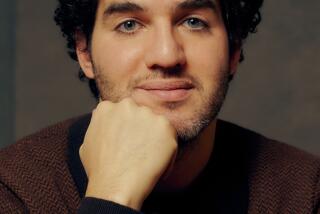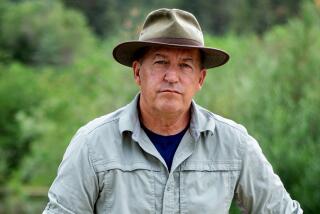Television’s Western Revival Is Shooting Itself in the Foot
- Share via
“You be Verlon Borgers, I reckon,” drawls the earnest hero to the stubble-bearded heavy.
And, I reckon, this be “Ned Blessing: The Story of My Life & Times,” an end-of-summer series on CBS with legs bowed enough to drive through a herd of longhorns. The Old West deserves better.
It gets it in a whimsical way with the Aug. 27 debut of “The Adventures of Brisco County, Jr.,” the endearing Western baloney leading Fox’s new Friday lineup into the jaws of the fall season.
The difference between “Ned Blessing” and “Brisco County, Jr.” is the difference between a series that is accidentally humorous and one that aims to amuse, and succeeds.
“Ned Blessing” is the former. Its wide-bodied protagonist has all the requisite bigs for heroism in Western fables--big frame, big hat, big jaw, big gun, big heart--balanced by a small brain.
This is a second chance for “Ned Blessing,” which sliced an unnoticed one-episode divot into prime time last year with Daniel Baldwin as Ned. Conceived by Texas screenwriter Bill Wittliff, “Ned Blessing” returns at 9 tonight on Channels 2 and 8 with hard-riding, soft-acting Brad Johnson in the title role, playing an outlaw-turned-sheriff who is such a crack shot that he can crease a man’s cheek with a bullet at 100 yards without killing him. Not only that, says his Latino medicine man/philosopher sidekick Crecencio (Luis Avalos), but Ned also “don’t know what fear is.”
Ned don’t know much about nothing, unfortunately, making him a poor candidate to help lead the revival of one of early television’s most lovable genres at a time when fascination with the Old West is on the upswing--perhaps because immersing ourselves in the past offers escape from the miseries of the present.
It was the popularity of “Lonesome Dove”--the 1989 award-decked CBS miniseries whose script Wittliff shaped from Larry McMurtry’s brawny novel about colorful individualists taking part in a cattle drive--that made Hollywood hearts pound like tom-toms at the prospect of a renaissance for that all-but-extinct species, the TV Western.
In the 1950s and 1960s, adult Westerns roamed like bison across the prime-time frontier, numbering a whopping 31 series at their peak in the 1958-1959 season. On Sunday nights alone that season, ABC aired four back to back.
Although many were forgettable, some of these oldies--”Gunsmoke,” “Rawhide,” “The Virginian,” “Wanted: Dead or Alive,” “Maverick,” “The Monroes” and “Have Gun, Will Travel” to name a few--seem in retrospect to have been as provocative as they were action driven. At least that’s the memory.
As a group, TV Westerns joined their movie brethren in feeding what some scholars feel is a misconception about the Old West being far more violent and chaotic than it was. At the very minimum, though, these series were allegorical feasts, giving writers an opportunity to do stories with contemporary themes under cover of the past, during a 1950s era of blacklisting when free expression was under withering attack.
Westerns began vanishing in the mid-1960s, victims of an early backlash against TV violence and a growing emphasis on demographic research. In this case, the research showed that the core audience for Westerns was the older crowd that advertisers least desired.
Meanwhile through the years, television has had air time on its hands, and much of it has been consumed by an endless supply of antique movie Westerns. Along with “Lonesome Dove,” though, it was the critical and commercial success of two recent theatrical blockbusters--Kevin Costner’s “Dances With Wolves” and Clint Eastwood’s “Unforgiven”--that helped drive the present momentum, as did the emergence last season of “Dr. Quinn, Medicine Woman,” a CBS series about a pioneering female physician who wins the hearts and minds of the Old West.
Just where “Ned Blessing” and Fox’s “Brisco County” fit into this equation, if at all, remains to be seen. Unlike “Lonesome Dove,” neither touches the dusty soul of the frontier or offers a sense of national identity through the prism of history.
The bad timing of “Ned Blessing”--it arrives on a crescendo of shootouts at a time when television violence is in America’s cross-hairs--is the least of its problems. Last year’s “Ned Blessing” had Ned already sheriff of his hometown of Plum Creek, Tex., seeking to avenge the murder of his father. Scratch that. Tonight’s savagely long two-hour premiere finds an elderly Ned writing his memoirs while inexplicably in jail awaiting the hangman, reminiscing about when he returned to Plum Creek in search of his father. By the end of the flashback, the young Ned has been convinced to stay on to succeed Plum Creek’s unfortunate sheriff, whose head now resides in a pickle jar on the bar in a local saloon. It was installed there by the demonically criminal patriarch of the family that rules the town through terror and violence.
If you reckon he be Verlon Borgers, you reckon right.
The selfless Ned plays Shane to a couple of black sharecroppers victimized by Borgers (Bill McKinney), acquires Sidekick II in the cowering Sticks Packwood (Tim Scott) and attracts a couple of pals in the fetching Wren (Brenda Bakke) and enigmatic One Horse (Wes Studi), an American Indian who carries a sack whose contents are unknown.
“Ned Blessing” has to do something to fill two hours, so Wittliff overreaches for a subplot that finds Borgers’ clunking sons suddenly discovering a moral compass. By this time it’s “Ned Blessing” that’s hopelessly off course, and you’ll probably laugh your spurs off when watching Plum Creek’s sadistic Brunhild, Big Emma (Rusty Schwimmer), ride a horse and seeing the shrewd plan Borgers has devised to erase Ned and his sidekicks.
The murderous Borgers is evidence that they don’t make bad hombres any smarter than they used to. After capturing Ned and Sticks, does he plug them and be done with it? Nah, too easy. Instead he departs, cleverly leaving them in the company of a rattlesnake that gives Sticks--who does know what fear is--time to wriggle free. When Sticks mentions shooting off the vicious rattler’s head, Ned will have none of it. “You wouldn’t want to do that. He’s just bein’ a snake.”
One step forward for animal rights, two steps backward for TV Westerns.
More to Read
The complete guide to home viewing
Get Screen Gab for everything about the TV shows and streaming movies everyone’s talking about.
You may occasionally receive promotional content from the Los Angeles Times.






